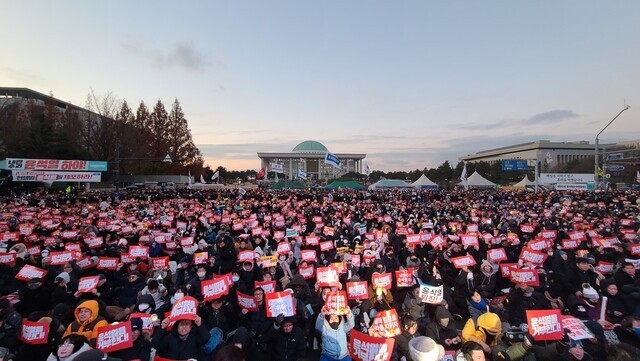[Editorial] In dooming impeachment vote, ruling party cements place on wrong side of history
On the rain-drenched day of the impeachment vote, the halls of the National Assembly buzzed not with anticipation, but resignation. With wind howling outside as a vivid picture of the political scene in South Korea, the ruling People’s Power Party (PPP) took a significant step towards sealing their place on the wrong side of history.
An impeachment motion aimed at unseating President Yoon Suk-yeol was brought to a standstill when ruling PPP lawmakers decided to boycott the vote. A staggering majority of National Assembly members, 200 out of 300, are required to attend and vote for an impeachment motion to carry. Yet, with only 195 lawmakers present, including every member of the opposition and a mere three PPP members, the vote failed.
With this action, the ruling party has not only doomed the impeachment vote but also cemented its place among power-hungry elites who choose self-interests over democracy and justice. The boycotting of the vote is not only a poor exhibition of democratic responsibility, but it’s also a short-sighted political strategy that ignores the cries of citizens and civil society groups demanding accountability for presidential misconduct.
This vote brought into sharp relief an alarming facet of the ruling party’s ethos – dissent equating to betrayal. The mere fact that an impeachment motion was necessary speaks volumes about President Yoon’s alleged improprieties. By shunting aside cries for an impeachment vote, the ruling party suggests to its electorate that principles take a backseat when power preservation is at stake.
One could argue that party unity is crucial in political warfare. However, when unity compels ignoring the apparent wrongs of a party member, it becomes a tool of oppression. The ruling party’s decision to veto a decisive investigation into potential abuses of power reflects a worrying trend of party over principles.
This instance has reechoed the nation’s struggle for a democratic political environment that values transparency, accountability, and the rule of law. The opposition parties, in their unanimous voting, showcased a unified front, holding onto the cornerstone of democracy — accountability.
It is extremely concerning how complacency towards alleged wrongdoings of those in positions of power has become a normalized political maneuver. When the ruling party unyieldingly defends its leader instead of acting as a check to the executive’s potential abuse of power, it sends a clear message that they value personal loyalty over the democratic process and the rule of law.
The PPP has set out on a dangerous path, where political expediency is valued over ethical conduct and democratic norms. This stance will likely lead them down a path of little regard for public opinion, with disillusionment and mistrust growing among the electorate.
The refusal to participate in the impeachment vote is a disparaging display of the ruling party’s lack of commitment to democratic rights and responsibilities. By continuously aligning itself with a president accused of impropriety and disregarding the rule of law, the PPP is writing itself on the wrong side of Korean political history. Their dismissal of an opportunity to uphold justice sends a firm message to the audience of this political theatre, South Korean citizens, that power supersedes principles within the PPP hierarchy.
Time will tell whether such a cost to democratic ethos and public sentiment will be worth any short-term political gain for the PPP. Yet, one puts into history what one takes from the present, and the ruling party should perhaps be




